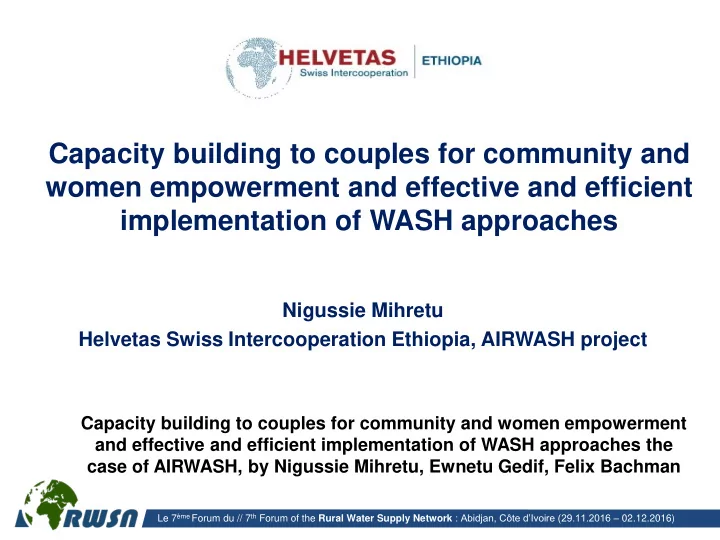

Capacity building to couples for community and women empowerment and effective and efficient implementation of WASH approaches Nigussie Mihretu Helvetas Swiss Intercooperation Ethiopia, AIRWASH project Capacity building to couples for community and women empowerment and effective and efficient implementation of WASH approaches the case of AIRWASH, by Nigussie Mihretu, Ewnetu Gedif, Felix Bachman Le 7 ème Forum du // 7 th Forum of the Rural Water Supply Network : Abidjan, Côte d’Ivoire (29.11.2016 – 02.12.2016)
1: INTRODUCTION • Ethiopia has low WASH coverage Rural 49%; Urban 93%; • AIRWASH project is under implementation in 3 districts of North Western part of Ethiopia; • The couple capacity building enhanced gender equality, full implementation of WASH approaches. Le 7 ème Forum du // 7 th Forum of the Rural Water Supply Network : Abidjan, Côte d’Ivoire (29.11.2016 – 02.12.2016)
2.Objectifs / Objectives • To change the patriarchal attitude which restricted women’s active participation; • To empower women and the community by accessing information about WASH; • To fully implement WASH approaches by building the capacity of households rather than individuals. Le 7 ème Forum du // 7 th Forum of the Rural Water Supply Network : Abidjan, Côte d’Ivoire (29.11.2016 – 02.12.2016)
3: Contexte / Context • In this village women had drudgery of fetching water; • Community suffering from sanitation and hygiene related diseases; • Domestic violence was common; • Relatively married women had less access to WASH related information Le 7 ème Forum du // 7 th Forum of the Rural Water Supply Network : Abidjan, Côte d’Ivoire (29.11.2016 – 02.12.2016)
4. Méthodes/Methods • Couple training & monthly community discussions; • Exchange visit of couples to a village known for ensuring gender equality; • House to house visit by all users & active role of promoters. Le 7 ème Forum du // 7 th Forum of the Rural Water Supply Network : Abidjan, Côte d’Ivoire (29.11.2016 – 02.12.2016)
5. Résultats / Results • Mutual understanding between husbands and wives increased; • Women’s awareness about their rights related to WASH raised & domestic violence avoided; • Men understood gender division of labour as socially constructed and helped wives in household chores; Le 7 ème Forum du // 7 th Forum of the Rural Water Supply Network : Abidjan, Côte d’Ivoire (29.11.2016 – 02.12.2016)
6. Analyse / Analysis • The root cause of women’s work burden and absence in WASH decision making is patriarchal; • This capacity building broke the glass ceiling and helped husbands and wives to discuss about gender division of labour; • As married women got WASH related information sense of ownership enhanced. Le 7 ème Forum du // 7 th Forum of the Rural Water Supply Network : Abidjan, Côte d’Ivoire (29.11.2016 – 02.12.2016)
7. Discussion • Since the village was with low WASH coverage, high burden on women and girls; • Involving the main WASH actors, women is an important ingredient for WASH sustainability; • The participation of couples in capacity building activities eased implementation of WASH approaches Le 7 ème Forum du // 7 th Forum of the Rural Water Supply Network : Abidjan, Côte d’Ivoire (29.11.2016 – 02.12.2016)
8. Leçons apprises / Lessons Learned • Couple capacity building interventions enhance mutual understanding at HH level • Time and place is important for women’s full and active participation in WASH activities; • Sense of ownership increased as married wives actively participated in couple capacity building activities Le 7 ème Forum du // 7 th Forum of the Rural Water Supply Network : Abidjan, Côte d’Ivoire (29.11.2016 – 02.12.2016)
9. Conclusion • Women especially married ones less informed about WASH related diseases, decision making, gender division of labour; • The couple capacity building broke the glass ceiling and brought women as main WASH actors; • This approach could scale up in other parts of the country. Le 7 ème Forum du // 7 th Forum of the Rural Water Supply Network : Abidjan, Côte d’Ivoire (29.11.2016 – 02.12.2016)
Remerciements / With thanks to AIRWASH Team, Helvetas Ethiopia, Helvetas Head Office, MWA Ethiopia, SWSC Le 7 ème Forum du // 7 th Forum of the Rural Water Supply Network : Abidjan, Côte d’Ivoire (29.11.2016 – 02.12.2016)
Recommend
More recommend